|
Have you ever wanted to start to practice on the organ but found yourself sidetracked after a few days? Apparently your inner motivation wasn't enough.
I know how you feel. I also was stuck many times. What helped me was to find some external motivation as well. In order for you to advance your organ playing skills and help you motivate to practice, my wife Ausra - @laputis and I invite you to join in a contest to submit your organ music and win some Steem. Are you an experienced organist? You can participate easily. Are you a beginner? No problem. This contest is open to every organ music loving Steemian. Here are the rules
Comments
Would you like to learn Maestoso in D Minor from L'Organiste by Cesar Franck? I hope you'll enjoy playing this piece yourself from my PDF score. Thanks to Juan Osorno for his meticulous transcription from the slow motion video. What will you get? PDF score with complete fingering written in which will save you many hours of work. Basic Level. 1 page. Let me know how your practice goes. This score is free for Total Organist students. Check it out here
Vidas: Hi, guys, this is Vidas.
Ausra: And Ausra. V: Let’s start episode 461, of Secrets of Organ Playing Podcast. This question was sent by Guinn, and Guinn writes: Good Morning, I purchased 10 Day Organ Pedal Playing Challenge last night. I have a flat Baroque 27 note pedal board, normal for Baroque which is what I play. I cannot possibly play those exercises as indicated with toe and heel. Most of them have the incorrect clef marking. Treble clef is marked, this must be an editorial mistake. What must I do? How do you direct students with a normal Baroque pedal board? Thank you, Guinn V: Well, remember the day that we did this challenge? A: Yes, I remember it. V: We took um, do you remember where those exercises were taken from? From ear-training-- A: Yes, I remember that, yes. V: From French method book. And therefore it’s not a mistake of course. In ear-training, they write everything in treble clef. A: Yes. And of course it would be original organ piece, you would definitely use the bass clef. But the thing is, what you do with treble clef? You just play it an octave or two octaves lower. And that’s it! V: Yes. Which means that you could do the opposite—if you encounter something written in the bass clef, you can play an octave or two higher and you could practice with your hands. A: Yes. It’s not like sight-reading the C clef. That might be challenging for some musicians, but basically to go from bass clef to treble clef, it shouldn’t be a problem I think for any musician, even non-professional. V: Mmm-hmm. Exactly. So the first advice would be to practice those exercises one octave or two octaves lower than it is written. A: And another thing; I don’t think these exercises are intended for Baroque organ or Baroque pedalboard. It’s for, intended for more modern instrument. V: Mmm-hmm. A: And not for a flat pedalboard. Of course you can do some of those with Baroque pedalboard but I think intention is not to play it on the Baroque instrument. V: Well, it is written, in Day 1, actually, even when people get Exercise #1 in Day 1 it is written; ‘taken from Solfege Method Books by Frederic Boissiere from 1877, and in the parenthesis I write ‘feel free to practice the exercise in the tenor and or bass octave’. So… A: So, I guess it just shows how people don’t read instructions. V: Mmm-hmm. And you even can feel free to sing these exercises which could improve your musical pitch, right, Ausra? A: True. True. V: Not only your technique as an organist but also your ability to differentiate different keys and pitch levels. What we do in ear-training classes, we sight read things. And organist would benefit from this skill as well. A: And this Exercise #1, I think it can be done on the Baroque pedals as well. V: Except when you have heel written in. A: Yes. You need to use toes… V: Toes. Yes. A: of course if you are playing Baroque pedalboard. V: Whenever you see heel, you could maybe use toes for that, but there are some delicate instances where you need to change things completely, but I don’t think it’s necessary. You could simply, instead of heel, use the toe. Don’t you think, Ausra? A: Yes, definitely. Because on the Baroque instrument you wouldn’t use heel… V: Mmm-hmm. A: on the pedalboard. V: And therefore you would actually play not entirely legato, in articulate legato style. A: Of course. V: So, I think that would be suggestion for Guinn, who likes to play Baroque, probably music, on the flat Baroque 27-note pedalboard. A: And actually, I not quite got the last question in his letter, ‘how do you direct students with a normal Baroque pedalboard’? What’s the normal Baroque pedalboard mean. Do you mean that only Baroque pedalboard is normal, or you have Baroque pedal, one that is normal and another that is not normal? V: I think he, if I understand correctly, I think he maybe implies those exercises suitable for non-Baroque pedalboard but what to do on the Baroque pedalboard, like he has. A: So I guess you already answered it. V: Yes. A: That you have to adjust it a little bit. V: Mmm-hmm. A: But definitely, if I would need to learn some, or to improve my Baroque technique, on the Baroque instrument, I might choose exercises like J.S. Bach’s Pedal-Exercitium. V: Mmm-hmm. A: And things like this. V: Well exactly. So we hope this was useful to you. Try out this exercise system. It really helps. It’s not a long thing, just ten days. It’s like a mini-course. And in ten days you will certainly feel much improvement. A: But definitely, I think it’s intended more for modern music, for later music, for romantic and for modern music. Because Baroque music is not so much pedal challenging as later music. V: Mmm-hmm. Yes. A: Don’t you think so. V: Yes. Do you think it’s possible to play with heels on the Baroque pedalboard? A: I wouldn’t do that. I would not recommend to do that. V: Do you remember when were in one conference at Eastman School of Music, and somebody told that they had one student who practiced and maybe even mastered Sonata by Reubke on pedal clavichord. You remember it? A: Yes, I remember that, it is some sort of experiment. V: Mmm-hmm. A: It could work, but is it a rule? I don’t think so. V: And maybe it’s even counter-productive, because if you have this flat pedalboard, and practicing with heels… A: I’m afraid you might injure your legs, and it’s not good for your feet. V: But also, if you then switched to real Baroque music, you might start to feel like playing with heels, that kind of music on that pedalboard, which would defeat the purpose, I think. A: True. V: So, for Guinn I would probably switch to toes only technique I think. Could work easily, I think. Alright! Let us know how it goes, and keep sending your wonderful questions in the future. This was Vidas. A: And Ausra. V: I hope you will be able to practice today. We practiced in the morning and we are now feeling that our day was well spent, right, Ausra? A: True. V: And remember, when you practice… A: Miracles happen! SOPP457: I do have to work on my pedaling some more work on my coordination between hands and feet7/12/2019
Vidas: Hi guys, this is Vidas!
Ausra: And Ausra! V: Let’s start episode 457 of Secrets of Organ Playing Podcast. This question was sent by Bass4Art, and he writes: “Hi Vidas I have a Kawai Electronic full console organ here at my house. While I took some time away from practicing, I have been taking piano lessons, in fact, I am up to advance level 5 and beginning level 6 and still plugging away at it. Now I have gotten myself up to that level, I like to push my organ playing up to that level as well. I do have to work on my pedaling some more work on my coordination between hands and feet. While I have gotten rid of a lot of the organ music I had. I still have a full pile of it. So how would you advise? Not this coming up month, but more towards the end of the year. I do plan on purchasing your organ training course to help me with those things.” V: So, Ausra, he seems to be able to play at the level of 5 and 6 in piano, so maybe that’s grades 5 and 6 in some systems. A: Well, I’m not sure, you know? V: Me, either. A: In what kind of system is he training? Because, if he would be like our old piano students are at my school, at this grade, he would be quite advanced already. V: Yeah! A: Because we are playing really difficult repertoire at such level. But, the thing that concerns me is that it seems he wants to proceed probably with both instruments at the same time, and I think it might be quite hard, because although both these instruments have keyboards, they are quite different, and they require quite a different approach and different techniques to be developed. And finally, you still have to decide what you are. Either you are an organist or you are a pianist. You cannot be both at the same time. V: At the same level. A: Yes, at the same level. V: Yes, yes. This is wise, to choose at some point. So, he has to ask himself what he values more, and what is more important to him. But, if he wants to advance in organ from this level, I’m not sure again—it’s speculation, because we don’t know exactly what pieces he’s playing. Right? But presumably, in the piano area, he has some finger proficiency. It’s not level one, but it’s 6. But it’s not level 10, so maybe somewhere in the middle, depending on actually reality. Sometimes, people say they can play that level, but it’s not quite clear if they can perform at that level. Right? For example: if I’m practicing Chopin Etude at home, it doesn’t mean I can play Etude at the recital. A: True. V: So… maybe some basic organ works would suit him—short chorales from “Orgelbuchlein,” maybe, A: Yes! V: We have plenty of fingering and pedaling for that. A: True. V: Not too long pieces, I would say. And, it depends on his preference of style. Maybe he likes legato stuff more, then maybe he should take a look at Romantic composers—a little bit easier pieces. But with pedals, probably. A: Definitely, if you want to play the organ, you need to learn to play pedals. V: Alright! And of course, pedal technique will advance much further if he took our pedal virtuoso master course. So, we hope this was useful to you. Please send us more of your questions; we love helping you grow. This was Vidas, A: And Ausra, V: And remember; when you practice, A: Miracles happen!
Vidas: Hi guys! This is Vidas.
Ausra: And Ausra. V: Let’s start episode 459 of Secrets of Organ Playing Podcast. This question was sent by Blackstone, and Blackstone writes answers to my question about the dream in organ playing and three things that holding back from the progress. 1. My dream for my organ playing is to spice my music creativity with some great organ sonic vocabulary. 2. The 3 things hindering my progress are: (i) Inadequate practice, (ii) lack of instructional resources, (iii) Don't have my own instrument. V: So this is rather unspecific to me, this dream. What about you, Ausra? Can you decipher for me this: “To spice my music creativity with some great organ sonic vocabulary…” It’s like a riddle for me. A: It is, it’s very sophisticated. V: It might be that he is… I don’t know if Blackstone is here or not, but let’s call…. I dunno. “Creativity” means maybe, like, composition or improvisation? A: Could be both. V: Could be both. Something like… creating, not performing? A: And “sonic vocabulary…” Does he mean to add some sound effects? V: Some sound effects. Maybe some organ stop combinations? Or… A: Well, anyway guys, we are not so sophisticated to be able to solve riddles. V: …read your mind. You need to clarify things. But let’s presume that organ composition and improvisation is what Blackstone is after. So, we could talk a little about that, right? A: Well, I’m not so sure. V: But then, let’s keep reading. A: The second half of the question is much more clear to me. V: “Inadequate practice, lack of instructional resources, and don’t have my own instrument.” It doesn’t say like, it doesn’t imply composition or improvisation at all. A: True, but in other words, practice is related with that, I think, he doesn’t have his own instrument. V: Mm hm. And we have talked many times about that before so, if you’re serious about organ playing, you can do two things: 1) invest in your own instrument, electronic probably, and 2) get in touch with the local church organist and, by offering something in return to that church, get access to the organ. A: Yes, because if you will not practice, you will not improve. That’s obvious. V: And once you have that instrument available, then you can practice adequately, meaning that you have to practice regularly, going to that instrument on the organ bench multiple times during the week. Probably slow practice is important, repeated practice is important, maybe practice in fragment is important. Think like that, for starters. A: True, and that point, the lack of instructional resources, do you think it’s easy to overcome this obstacle? V: With our seven years of online experience, or even more years (we started in late 2011), just look at our site, search what’s available for free, what’s available for purchasing, and you can find more than enough for many recitals by now. And hymn playing as well. Whatever’s interesting to you. I think he doesn’t mean probably, composition, because his three things listed aren’t related to composition at all. A: True, but it’s hard to say. I don’t know what we’re talking about here. V: Yeah. Let’s talk about air. Isn’t it hot today, Ausra? A: Horrible. V: We’re recording this in the morning. 7:00, and it says, what the temperature says outside… 30 degrees? A: Yes. V: Celsius. It’s approaching 100 in Fahrenheit, I think. A: I know we are sort of like northern Europe, geographically, but it feels like we are in the southern part. I think it’s not so hot in Spain right now. V: Exactly. Alright, guys, thanks so much for your questions. Please be more specific, though, if you want more specific help. A: Otherwise, we will be able to talk only about air. V: Yeah, but if you’re too specific like “How to play note C in measure 5 in this particular piece,” then it’s not interesting to others, right, it’s just for you. A: But we still can answer questions like this. V: Yes. But be specific and also general enough so our group of organists from around the world could relate to. Thank you, guys. This was Vidas. A: And Ausra. V: Please send us more of your questions. We love helping you grow. And remember, when you practice… A: Miracles happen. Would you like to learn Maestoso in D Major from L'Organiste by Cesar Franck? I hope you'll enjoy playing this piece yourself from my PDF score. Thanks to Jeremy Owens for his meticulous transcription from the slow motion video. What will you get? PDF score with complete fingering written in which will save you many hours of work. Basic Level. 1 page. Let me know how your practice goes. This score is free for Total Organist students. Check it out here
Vidas: Hi, guys, this is Vidas.
Ausra: And Ausra. V: Let’s start episode 458, of Secrets of Organ Playing Podcast. This question was sent by Alessandro, and he writes: Dear Vidas "The Total Organist" has the taste of being very intriguing and complete. But from your video I have not well understood: 1) The total duration of the course 2) The total price of the course 3) If one has to master every section of a level before passing to the next level, or the pupil can choose exercises by carefully looking at what he can already do and knows and what are still his/her weak points? 4) The pace of tuition: if I'm a slow learner what happens then? May I see and re-see the videos again and again? May I also write an mail asking for explanation (I'm sure that I may, since I did it in the past) 5) Can i get in touch with other learners Sorry for bothering you, but I need to Clarify these points Thank you very very much for your answer Alessandro V: Well it’s nice, Ausra, that the people are wondering about Total Organist, and we need to clarify some things probably. A: Yes, and I think you are the best who could do it, so please be so kind and explain us. V: But you don’t go away. I might also ask you some feedback. A: Okay. V: Alright. So number one was the total duration of the course. It’s obviously open duration. It’s no set ending. Once you start the course, you freely progress through the trainings that you have chosen. And you can unsubscribe at any time, by the way. Two: the total price of the course, right now, is in two options: if you pay monthly fee then it’s 69.00 dollars per month. If you pay a yearly fee, then it’s 699.00 dollars. Number three: he wonders about passing to next level—how to choose the level probably, right? A: Yes. V: So the level you choose, it’s written in several layers. The first layer is beginning level, then comes the basic level, then intermediate, and then advanced level. So, if you are considering yourself, let’s say a basic level organist who can play some things but not very well, then this section is for you and you can freely choose anything from that section. If this is, first you try for a couple of days, right, and if it’s really frustrating, then you need to go back one level and practice from the beginning level. Or, if it’s too easy for you, then jump to the intermediate level. That’s how you decide what’s suitable for you. I think that’s what he means, right? A: Yes, I think so. V: Number four, the pace of tuition. I mean, he is worried about, if for example he receives weekly trainings in his email inbox and he’s not able to master each weeks exercise on time, can he progress at his own pace? A: I think he can do that. V: Yeah! Of course he should archive those emails, not throw away, and practice at his own pace, and sooner or later he will master that particular course, I think. And the same is with videos: you can watch many times, as many times as you want, anything that is available. Alright, and the last point is ‘can he get in touch with other learners’? And that’s why we have Basecamp. A: Yes. I thought you are going to talk about Basecamp. V: Basecamp is wonderful because they have this ability to chat, which is called Campfire. And people can really make wonderful discussions there. Not only like, not only myself when I announce something for everybody, but people can really go at it and say some things to the group. Alright. Wonderful. Do you think this will be helpful to Alessandro and others who are hesitant and not sure about Total Organist? A: Well, I hope that it will be useful. V: And if not, keep sending us more questions, more particular questions about that and we might clarify and focus even more. Thanks guys. This was Vidas. A: And Ausra. V: And remember, when you practice… A: Miracles happen! Thank you everyone for participating! You all made us very happy with your entries. We thank Justinas Sapola who selected the following winners.
Have you ever wanted to start to practice on the organ but found yourself sidetracked after a few days? Apparently your inner motivation wasn't enough.
I know how you feel. I also was stuck many times. What helped me was to find some external motivation as well. In order for you to advance your organ playing skills and help you motivate to practice, my wife Ausra - @laputis and I invite you to join in a contest to submit your organ music and win some Steem. Are you an experienced organist? You can participate easily. Are you a beginner? No problem. This contest is open to every organ music loving Steemian. Here are the rules Would you like to learn Quasi allegro in D Major from L'Organiste by Cesar Franck? I hope you'll enjoy playing this piece yourself from my PDF score. Thanks to Jan Pennell for her meticulous transcription from the slow motion video. What will you get? PDF score with complete fingering written in which will save you many hours of work. Basic Level. 2 pages. Let me know how your practice goes. This score is free for Total Organist students. Check it out here |
DON'T MISS A THING! FREE UPDATES BY EMAIL.Thank you!You have successfully joined our subscriber list.  Photo by Edgaras Kurauskas Photo by Edgaras Kurauskas
Authors
Drs. Vidas Pinkevicius and Ausra Motuzaite-Pinkeviciene Organists of Vilnius University , creators of Secrets of Organ Playing. Our Hauptwerk Setup:
Categories
All
Archives
May 2024
|
This site participates in the Amazon, Thomann and other affiliate programs, the proceeds of which keep it free for anyone to read.
Copyright © 2011-2024 by Vidas Pinkevicius and Ausra Motuzaite-Pinkeviciene.
Terms of Service and Privacy Policy
Copyright © 2011-2024 by Vidas Pinkevicius and Ausra Motuzaite-Pinkeviciene.
Terms of Service and Privacy Policy

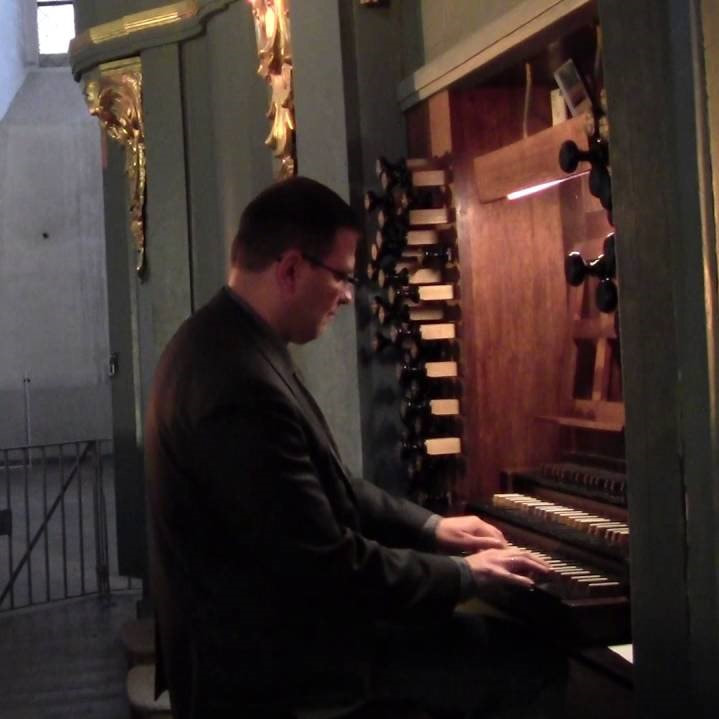
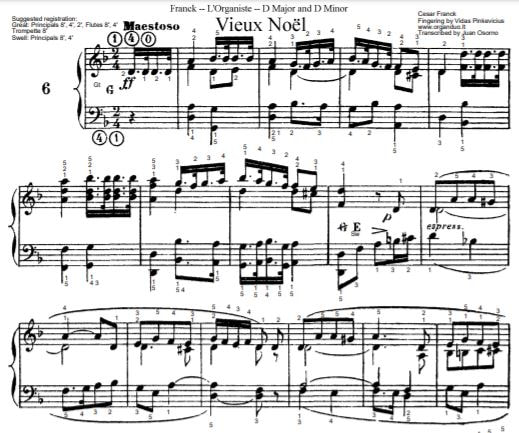
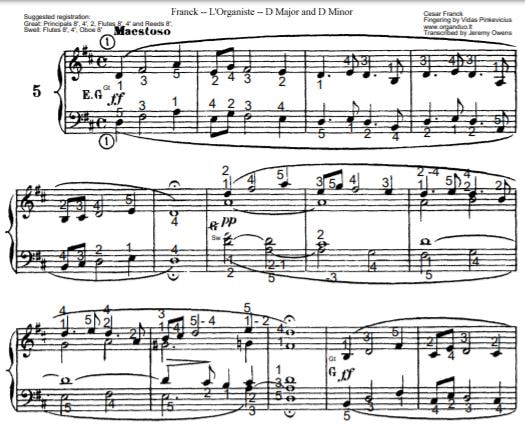
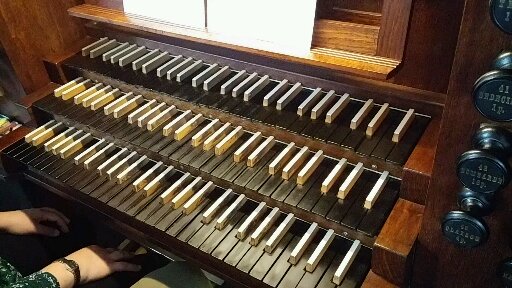
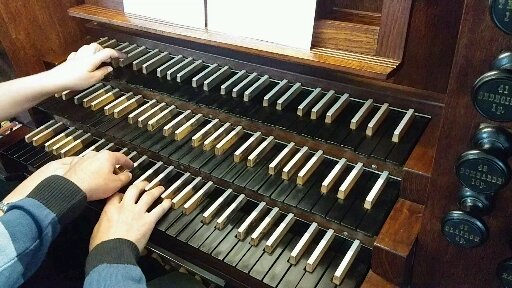
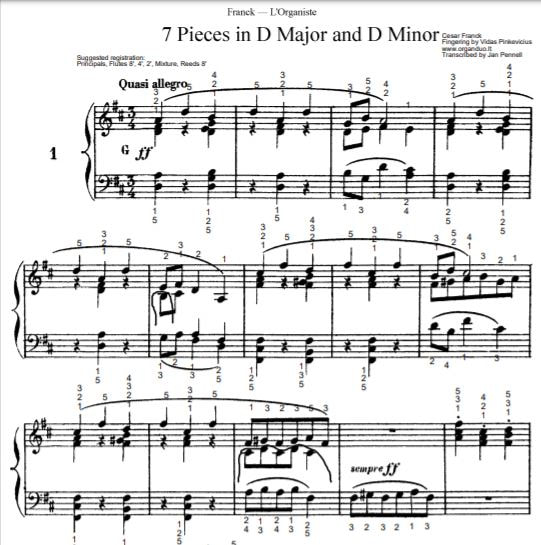



 RSS Feed
RSS Feed